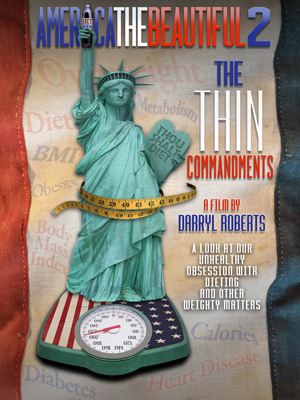Film, Panel Probe America’s Obsession with Dieting
Roberts documentary targets “thin commandments”

Reviewing Darryl Roberts’ 2008 documentary America the Beautiful, which chronicles the nation’s media-fed pursuit of an impossible physical ideal, critic Roger Ebert concludes that “the cold fact is no one can look like a supermodel and be physically healthy.” In the years since the film’s release, the nation has arguably grown even more obsessed with dieting, with the 2010 weight loss industry worth a record $60.9 billion, according to the market research firm Marketdata Enterprises.
Roberts will be at BU tonight for a panel discussion addressing the implications behind our obsession to be thin, after a screening of his 2011 sequel, America the Beautiful 2: The Thin Commandments. The event, sponsored by BU Student Health Services (SHS), student group Active Minds of Boston University, the Eating for Life Alliance (ELA), and Timberline Knolls, a private residential psychiatric center in suburban Chicago providing treatment for eating disorders, is free and open to the BU community and takes place from 6 to 9:30 p.m. in the George Sherman Union.
“I’m especially proud that I made this film because the only way we can beat the dieting industry at its game is to engage in healthy behaviors at a wide variety of sizes,” says Roberts. Passionate and often humorous, America the Beautiful 2 examines the medical debate about whether you have to be thin to be healthy or whether it’s possible to be healthy in a variety of shapes and sizes.
Appearing with Roberts on tonight’s panel are Margaret Nabig, a psychologist at Timberline Knolls, Whitney Post, president and founder of ELA, Jennifer Culbert (SAR’09), a nutritionist with Sargent College’s Sargent Choice Nutrition Center, and Margaret Ross, director of Behaviorial Medicine at SHS.
The aim of the screening and discussion is to raise campus awareness of eating disorders, which are “insidious and challenging illnesses” that untreated “become a way of life,” says Ross. According the National Institute of Mental Health, 9 percent of women and 3 percent of men will develop anorexia, most by age 20. Over their lifetimes, 5 percent of women and one percent of men will struggle with bulimia.
The Eating for Life Alliance refers to eating disorders as the most secretive of mental health issues, but says that these disorders, along with the associated problems of negative body image, anxiety, depression, and low self-esteem, are “very treatable with the right interventions.”
“The eating disorder, which at first seems like a friend, too often can feel like a prison, with no evident way to escape,” says Ross. While Behavioral Medicine is not an eating disorders facility, it can assess, monitor, and handle treatment referrals for these disorders. “It is important for people to know that there is help available, that there are clinicians and registered dietitians at BU who can smooth the way for a student who is scared, reluctant, ambivalent to get the help she or he needs,” Ross says. “Once a student—or friend or family member—makes the first call, the helping services are interconnected and will respond.”
A writer, producer and director, whose latest film chronicles his own weight-loss and exercise regimens along with fashion models’ tribulations with cosmetic surgery and anorexia, Roberts says America the Beautiful 2 has had a “slow burn” effect. His film takes aim at the body mass index (BMI) as an often misleading criterion for health and a trigger for unrelenting self-criticism, and explores the role that doctors, schools, and the government have played in America’s growing body dissatisfaction. As Roberts says, “Three minutes of looking at fashion magazines makes 90 percent of women of all ages feel depressed, guilty, and shameful.”
The screening of America the Beautiful 2: The Thin Commandments and a panel discussion following will be held from 6 to 9:30 p.m., Wednesday, February 20, at the George Sherman Union Conference Auditorium, 775 Commonwealth Ave. The event is free and open to the BU community, but registration is required; register here.
Comments & Discussion
Boston University moderates comments to facilitate an informed, substantive, civil conversation. Abusive, profane, self-promotional, misleading, incoherent or off-topic comments will be rejected. Moderators are staffed during regular business hours (EST) and can only accept comments written in English. Statistics or facts must include a citation or a link to the citation.